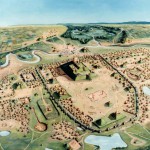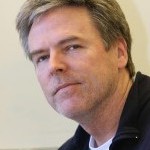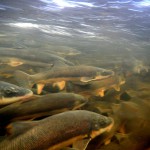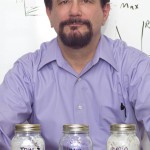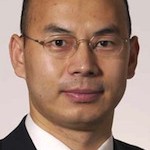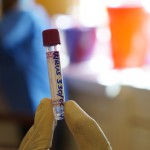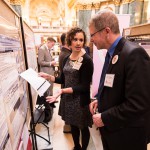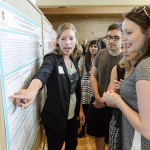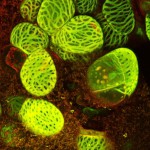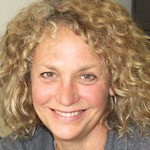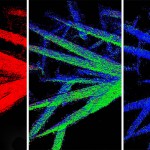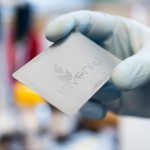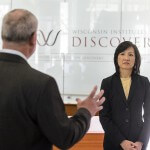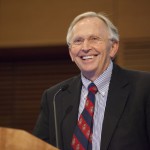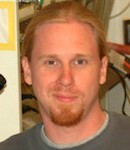Tag Research
As the river rises: Cahokia’s emergence and decline linked to Mississippi River flooding
As with rivers, civilizations across the world rise and fall. Sometimes, the rise and fall of rivers has something to do with it. At Cahokia, the largest prehistoric settlement in the Americas north of Mexico, new evidence suggests that major flood events in the Mississippi River valley are tied to the cultural center’s emergence and ultimately, to its decline.
UW honors noted entrepreneurs with achievement awards
The University of Wisconsin–Madison Entrepreneurial Achievement Awards this year honor a graduate of the Department of Computer Sciences who co-founded the company that’s now WebMD, and a Department of Animal Sciences professor who has turned his patented technologies into startup companies.
McArdle’s Bradfield named interim WID director
Christopher Bradfield, a University of Wisconsin–Madison professor of oncology, has been appointed interim director of the Wisconsin Institute for Discovery (WID).
UW-Madison startup marries digital, physical worlds
A startup business that wants to link the realm of physical objects to the digital world of the Internet is basing its future on low-cost, highly engineered, one-of-a-kind plastic stamps.
Business will implement new phosphorus recycling process in Midwest
A University of Wisconsin–Madison startup is helping Midwest cities remove pollutants from wastewater through a new process that will benefit local farmers, too.
Compact UV lasers could identify substances from a distance
For soldiers in the field, the ability to identify an object or substance based on how it responds to light could mean the difference between life and death. They could, for example, determine from a safe distance if an approaching person or vehicle is carrying an explosive device or dangerous biological agent.
In Sierra Leone, a chance to learn from Ebola
When Yoshihiro Kawaoka and members of his research team first arrived in Sierra Leone in December 2014, the consistent wail of ambulance sirens was a frightening reminder that the Ebola virus was there, too.
Annual study shows Wisconsin poverty rose in fragile economic recovery
Researchers studying the economic and policy forces that affect Wisconsin poverty have released their latest results, which show that although the state economy is creating jobs, the poverty rate rose from 10.2 to 10.9 percent in 2013 using the researchers' expanded measure.
Messing named director of Waisman Center
Albee Messing, a University of Wisconsin–Madison professor of comparative biosciences and an international leader in research on Alexander disease, has been named director of the Waisman Center, UW–Madison School of Medicine and Public Health Dean Robert Golden announced April 14.
Deep national history of immigration predicts wide cultural comfort displaying emotion
People who live in countries built on centuries of migration from a wide range of other countries are more emotionally expressive than people in more insular cultures, according to research led by University of Wisconsin–Madison psychology Professor Paula Niedenthal.
Better battery imaging paves way for renewable energy future
In a move that could improve the energy storage of everything from portable electronics to electric microgrids, University of Wisconsin–Madison and Brookhaven National Laboratory researchers have developed a novel X-ray imaging technique to visualize and study the electrochemical reactions in lithium-ion rechargeable batteries containing a new type of material, iron fluoride.
Faster, smaller, cheaper: Technique could speed biologic drugs
Antibodies are specific molecules that can lock onto a particular cellular structure to start, stop or otherwise temper a biological process. Because they are so specific, antibodies are at the forefront of drug discovery. So drug companies want a faster route to step one: identifying which of the millions of possible antibodies will work against molecules that cause disease.
New developments in Midwestern canine influenza outbreak
Canine influenza outbreak
Patent office director offers views on intellectual property, diversity
The director of the U.S. Patent and Trademark Office spent Wednesday conversing with the UW–Madison community about the opportunities and challenges of intellectual property protection.
Carl Gulbrandsen to retire from WARF in 2016
Carl Gulbrandsen, who joined the Wisconsin Alumni Research Foundation (WARF) in 1997 and became managing director in 2000, will retire in 2016.
New materials repel oil underwater, could better clean up oil spills
University of Wisconsin–Madison researchers have announced a significant step forward in the development of materials that can ward off oil - a discovery that could lead to new protective coatings and better approaches to cleaning up oil spills.

